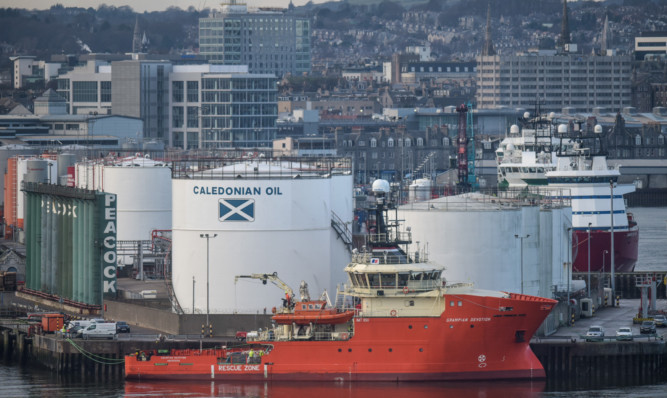Aberdeen, oil capital of Europe and boom town for decades, is finally feeling the pinch.
Build a city entirely out of grey stone and it will always be hard to believe there’s a carnival going on it is the word “dour” defined in three dimensions.
Of late, it has a lot to be glum about.
The oil is running out and the price is falling. This is bad news for Edinburgh and London, which have relied on oil to balance the books of governments real and imagined.
David Cameron is due in Aberdeen today to announce extra funds for new activities as the old ones die rather faster than expected.
The Prime Minister may quietly enjoy his day, feeling the crash in oil’s value shows the independence argument was always wrong.
An independent Scotland could have offered a rescue package too or used various levers to help the oil industry.
However, a standalone Scotland would have felt the impact of oil’s declining price far harder than the UK has as a whole.
Under independence, Brent crude at under $30 a barrel would have been news in every household, like the despatch from a natural tragedy. None of us would have been immune.
That’s not an argument against independence but it’s a problem for the SNP.
To combat the sense Scotland couldn’t afford sovereignty, the party developed an argument based on oil. Roughly, it said that in the decades since the black stuff came ashore, Scotland contributed more to the UK treasury than it got back in spending.
This is true. This meant Scotland could afford its higher per capita spending because of the surplus to the Treasury. This was also true while the surplus lasted.
However, the extra revenue is gone.
Had Scotland become independent in 1975 it could have had an oil fund and the money to maintain high public spending with relatively low taxes. But it didn’t. Instead, by the time the SNP could bring about a referendum, things were changing.
Scotland could no longer rely on global economic growth after 2008 and most of the oil was already gone. None of that stops us being independent, it just means there is much less money to go round.
The SNP leadership don’t fancy the idea of independence without spare cash. The only way to make it work and deliver a socially just society would be to radically reimagine our taxes and services but that kind of plan is never going to win a majority of votes.
This is why Sturgeon, privately, is very keen not to have another referendum.
As the euphoria of the last one ebbs away, it’s hard to imagine another vote happening at all. The popular view is that Yes nearly got there and only needs to try again. This is not how history will see things.
Instead, a tale of how the SNP weren’t prepared and blew their one shot is more likely.
The risk to Scotland is not the oil price, or the status of the SNP but that we sink into despair. Our national psyche tends to swing from triumph to tragedy. It is a malady we should resist at all costs.
The SNP’s model barely worked in 2014 and is bust now but that’s not the same as declaring everything worthless.
No doubt there was an element of selfish opportunism, like we’d won the oil lottery and had to grab the prize quickly. But there were many other factors at play in our protracted national debate.
The experience of devolution and the independence referendum was ultimately positive. Scotland is a far better place now than it was in 1984, when I first worked in SNP HQ as a student.
Then, we seemed to be angry and aimless. Now we are much more confident and self-aware.
We have a parliament and tax powers coming (if not soon, then eventually). No one but a Scottish politician can determine our education policy or health, investment or law. This is not the helpless, damaged Scotland of the 1980s this is a land revived.
Our error has been to pin too much on oil, as if it were a handful of magic beans.
The price goes up, the price goes down, more is discovered, stocks run empty these are just the swings of a commodity. If we don’t get another penny from the sea bed, that does not diminish our values, society or right to govern.
This is already a new Scotland, a much better place and it has the powers to get better still. Don’t let the fall in oil prices be an excuse for giving up.
A standard phrase in the nationalist canon is “too wee and too poor’ a characterisation of opponents, implying that unionists talk down Scotland. Scotland is not too wee or poor to be independent, it is just not rich enough for the SNP promises. Politicians oversold what they can do there’s no news in that.
Just ask David Cameron.
